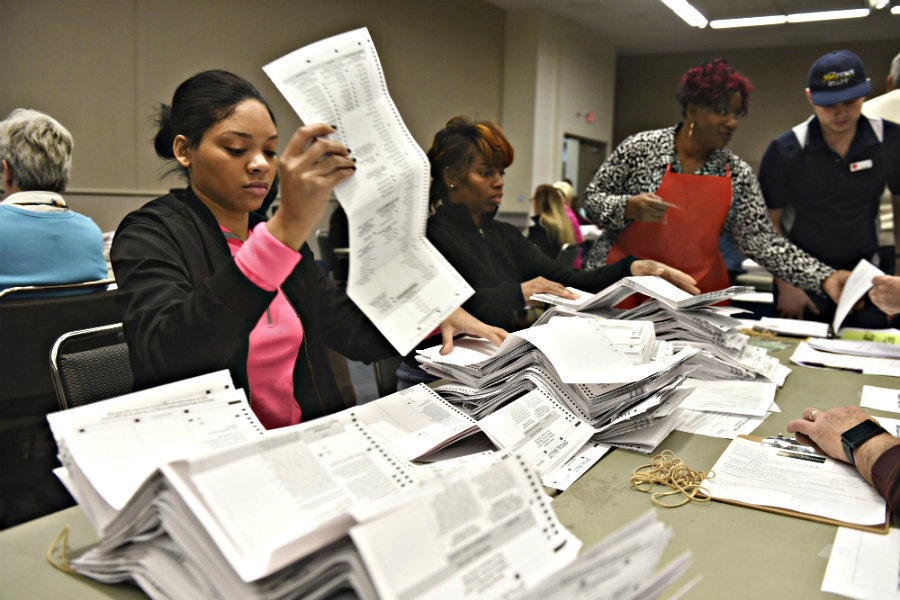Oklahoma City, OK. Citizen participation in free and fair elections is a hallmark of healthy democratic republicanism, so I hope you found the election’s large-scale turnout encouraging—wherever you land on the political spectrum. That said, I can’t get too far out of the gate without stating what in retrospect seems obvious: that mail-in balloting, absent some kind of mechanism for linking ballot and person (e.g., via a notary requirement), is ripe for disaster if not outright fraud.
One doesn’t have to have been glued to cable news for the last two weeks to know that debates about state election laws have become the focal point of the 2020 presidential election cycle. Just tune in to any cable news network. It’s all the rage. And, because the final makeup of the U.S. Senate hangs in the balance, with all eyes on Georgia, these debates aren’t going anywhere soon. Nor should they. Even so, I write today neither to survey nor scream about the election—though I’m inclined to—but rather to shed light on something else entirely: the ostensible triumph of federalism.
Federalism, for those who aren’t familiar, exists where a sovereign’s power is divided, usually between a central, and one or more territorial, governments. Even though sovereignty is technically indivisible, it is nevertheless capable of assignment to countervailing bodies. And so it is in the American system of governance. Though it isn’t much talked about today, federalism remains one of the great monuments of political philosophy generally and is, perhaps, the pinnacle of American constitutionalism.
As you probably know, however, the U.S. Constitution provides first not for federalism per se but instead for the “separation of powers” between the legislative, executive, and judicial branches of government. While this division serves as the organizing principle of the entire document, federalism proper emerges as a constitutional theme soon enough. Unlike the division of power amongst the branches, which today remains essentially the same as it was in 1803, after Marbury, the division of power between the state and federal governments is markedly different. Whereas the division of political power favored the states in the Constitution as originally written, on this side of the Civil War and Progressive Era Amendments, the balance of power is decidedly federal.
Or so you thought.
Sure, most of the Bill of Rights, originally intended to protect U.S. citizens from an overreaching federal government, has since been applied to the states. And federal regulation of the economy, which was to be handled by state and local governments, continues largely unabated under the courts’ expansive interpretation of the Commerce Clause. Even so, the states aren’t totally irrelevant. In fact, they still retain many powers, including the comprehensive “police power.” But even this power has recently come under attack. Just ask Oklahoma. Most election laws—like tabulating and certifying vote counts—remain under the purview of the states, too. And we should be thankful for that—despite the credible and all too cyclical allegations, and convictions, of corrupt local election officials. But in a world where we’re forced to choose between the local and the federal, I choose local.
Amidst the ongoing chaos and conflict over the 2020 presidential election, and vote tabulating methodologies in particular, let’s remember—and celebrate—that so far it is really only federalism that has won the day. Neither federalism nor the Constitution is perfect, of course, but surely they, as opposed to any party’s presidential candidate, or victor, are most responsible for keeping the chaos at bay. You may, quite understandably, have lost a little faith in our system over the last two weeks. I don’t blame you. But don’t lose heart.
For the moment, our political discourse—if we can still call it that—has been hijacked by the shrill voices of vitriolic pundits. But the Constitution, and federalism in particular, are holding their ground. They’re under attack, for sure, but they remain—as ever—the best bulwarks against the excesses of tyranny and pure democracy Western civilization has ever known. So, whether your guy lost or won, or whether you’re convinced the election still isn’t over, I invite you to join me in celebrating the enduring triumph of federalism, one of the last remaining forces for traditional democratic republicanism.






7 comments
David Naas
Of late (yesterday, in fact), I have seen from the Progressivists sharp calls to make all of the State’s election processes uniform in the interests of “justice and fairness”. This is the new shout, along with the old one of abolishing the Electoral College (which hardly anyone left or right seems to understand).
With almost loony tunes levels of paranoia about voter fraud, the fact of our great variety of election processes would seem to be a guarantee that said fraud is harder to achieve it all States are different than if all are alike. If each State choses whether to use paper ballots or election machines, allow or deny absentee ballots (a relic of our civil war), let alone how ballots are counted and certified, a hacker’s job is compounded to nightmarish levels. And, if something happens, is much more likely to be confined to one or two States than to affect the entire country.
But the agendas of Bigness and Standardization and Populism must have fungible citizens if they are to succeed, so…
So, hurrah for chaos and inconsistency. Few enough bulwarks remain standing against the Unitary state, and this flimsy sliver of “Federalism” is all that’s left. (Or is it?)
Grayson Walker
Thank you for your comments, gentlemen. I largely agree with these sentiments. What I really wanted to say here, but perhaps failed to, was that one of the last vestiges of our federal system as originally envisaged is state control of elections. And that, I think, is at least one thing to be thankful for. Thanks again for engaging.
Dan Grubbs
I’m not so sure I would celebrate federalism as we have it foisted upon us today in the United States. I still think we the people lost control of our country as a result of the discourse prior to the ratification of the Constitution when the urban industrialists (federalists) won the day over the rural agrarians (anti-federalists). The net affect is that our federal government is controlled by the industrialists (those of modern ilk) who want to operate in as unfettered a way as their lobby and influence will gain them, people be dammed. Strong state power and limited federal power would have been better. Alas, you are seeing the result now.
Jerry Lockhart
In answer to the issue bring forth, perhaps the answer is to legislate the abolition of professional lobbyists. That should help in 1,000s of areas.
Brian
“Unlike the division of power amongst the branches, which today remains essentially the same as it was in 1803”
Not really. The separation of powers among the branches was based on the branches being representative of different segments of society. That’s been completely destroyed in the last century, by “progressive” amendments and court cases. There’s no gain to be had from separation of powers between branches that are all dominated by one segment of society at the expense of another. (The one last vestige of the original idea is the US Senate, though the direct election of senators was a serious modification. At the state level the one-person one-vote atrocities utterly destroyed localism in most states.)
And the article ignores completely the fact that so much money flows down from larger distant entities. Local schools are in most cases funded not by local money, but by state and federal money. Ditto for so many other things–Medicaid, etc., and he who pays the piper pays the tune, as they say…
David Naas
It was over a century ago the Progressivist move to “democratize” elections began to take effect. Direct election of Senators, the Referendum,. Primaries, and others, were promoted to wrest control of the government from corrupt political machines (Tammany, Pendergast, etc.).
Experience with those mechanisms have simply demonstrated that corruption will live on, adapting itself to whatever rules the Do-Gooders set in placed, and actually help the corrupt to get away with their schemes.
The clincher is, in reading history books, I cannot see that government at any level has been run any better than it was in the old corrupt era of machine politics. “Different” yes, slightly, but “better”?
Jerry Lockhart
Further thought provoking reply, Brian. Thanks. I’ve never compared the pros and cons of one man, one vote. I shall now. Also, had never taken a dim view of the election of Senators–another avenue to clear up. Thanks again.
Comments are closed.